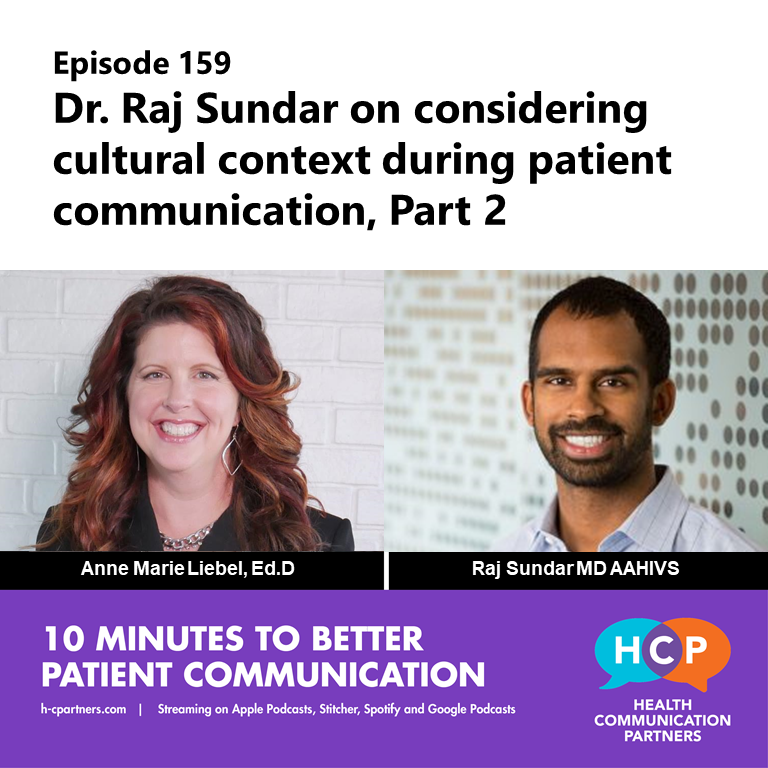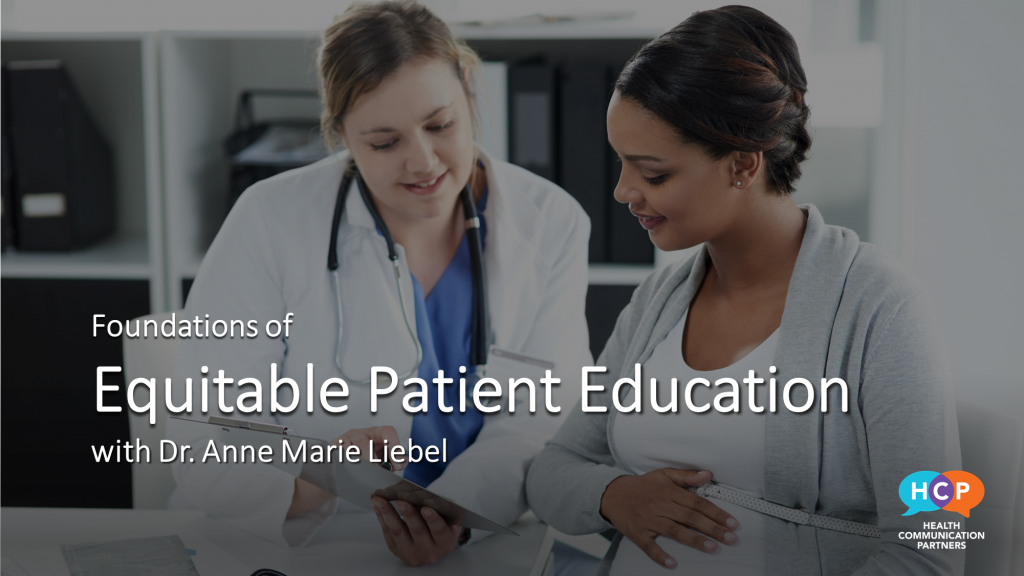In Part 2 of our interview, Dr. Sundar explains that reflecting on his communication has changed his perspective on caring for people–and made him a better clinician.

(ICYMI here’s Part 1 of this interview.)
Today is Part 2 of my interview with Dr. Raj Sundar about how he enacts his commitment to improving his communication with patients from different cultural backgrounds. Hi everybody, this is “10 Minutes to Better Patient Communication” from Health Communication Partners. I’m Dr. Anne Marie Liebel. We’re all responsible for doing work on health equity to reach specific goals and standards. Health equity goals are good to have, but not easy to reach. Our course Equitable Patient Education helps you meet your health equity goals with whatever patient population you are focused on. You will learn to manage common obstacles, and improve the patient education process, with any patient population. Everyone wants to see improvements and I give you concrete steps from years of experience working with the best. For more information visit Health Communication Partners or find me on Linked.
I’ll put links to Part 1 of my interview with Dr. Raj Sundar in the show notes. We’ll pick up here with a story I played last time, and we’re going to start with it now. It’s a story Dr. Sundar tells about what he has learned about communicating with his patients from Hawaii. And I mentioned last time, we’d recorded this before the tragic wildfires in Hawaii. I wonder if or how this new context will shape how you hear Dr. Sundar’s stories now. Here he is.
Raj: I use this example a lot because it is such a good example. It resonates with people. There’s a large native Hawaiian population, relatively, where we live. One thing that came out while I was talking to this community leader was: when we’re in the clinic, when we’re in the hospital, people often want to talk about their vacation to Hawaii as a way to build rapport. They say, “I was just in blank place in Hawaii. Where are you from?” It seems innocent enough. Maybe the clinician is well intentioned, trying to find a way to connect. Cuz we all do that with people we don’t know.
Anne Marie: Yeah.
Raj: But if you don’t understand the cultural context, the historical context, you’re actually undermining that relationship. Because Community leaders said, “Hey, here you are talking about vacation. But many of us, we left our state because we couldn’t afford it anymore, because of tourism. And now we’re in a foreign place and we can’t visit our family, because it’s too expensive, because of tourism. And here you are, saying you just took a vacation to Hawaii. Then you want me to respond in a happy way and connect with you. Then, share all my vulnerabilities with you. Then, you want me to listen to what you’re saying, right?” And I have no doubt I’ve probably done this in the past. And I was damaging that relationship. And I doubt in those instances, I know for a fact in those instances, they didn’t say, “stop talking about your vacation,” because that is not the power dynamic in that relationship at all. So this gave me space to understand that, so I don’t do, I don’t commit those I’ll say, infractions.
One of the things that I appreciate about your response there is that you’re not beating yourself up for that. You’re showing us, and I’m sure you’re showing your listeners, that you’ve learned that the remedy, right that the way to approach this is, not to go ahead and memorize—“aww, I should’ve memorized more things about Hawaiians!” It’s not that. It’s to reflect on your communication. And to keep reflecting on your communication. And keep thinking about how your words land on others. And keep thinking about the importance of context. And keep having these conversations with yourself and with others, in the space where you’re going to know: it’s going to happen again. Because we’re human and we’re interacting with other differently-positioned humans. And there’s not a way to get it right 100% of the time. And it sounds like you give yourself that grace and you definitely give your guests that grace on your show.
Exactly. And the take away with that example: yes, it’s about Hawaii and the specific comment about vacation. The takeaway’s also for me: do I know enough history about this community? Why they left the place they called home? What is their history here? How does that inform our relationship right now that we’re building? Those are big questions and now I’m very curious about that when I’m building relationships. Way more than I was before.
And taking the Long View that historical view is it’s a brave move. Because that’s it’s one of the most important contexts. I mean, we could we could name any number of contexts that have a significant bearing on a conversation. Taking a historical one is also, I think, a wise move, because it’s going to give you the historical background, historical backdrop, for the experiences of many, many people. Many, many potential patients that you might see, as you get more information about what’s going on historically, that’s a shared history, right? It’s not just one person’s history. So it’s also a very a very clever way of thinking about context that’s going to have an impact on communication.
I’ll —
Go ahead! All I was going to do is ask another question just so I could hear you talk some more!
Your question about what am I learning doing this, another point I wanted to make was ways my perspective is changing on caring for people. Because another example that I provide is taking care of the Ethiopian community. You may or may not know– I know because I talked to the leader now I have a relationship with that Community, or building a relationship with that community—I learned about the conflict there. Especially with the Tigrayan community. So last week, when I talked to a patient I brought this question up. I said, “I know there’s a lot going on in Ethiopia. Is that relevant to you? Is that something you think about?” For the next 10 minutes, that’s what he talked about. About his worry, concern about his family, his own self-identity, and how he doesn’t call himself Ethiopian anymore. Say “We’re Tigrayan.” I think it was really important for that for that patient because that was actually what was affecting his mental health, significantly, right. And I wouldn’t have known to approach or even ask that question if I didn’t have context into the community. Another important point is that a lot of people want to share, but they don’t. And someone said this explicitly, it’s like I open the conversation, so they knew I was curious enough to learn. Which means that I was curious enough to listen. Because they’ve had a lot of experience when people ignored what they shared, or they didn’t try hard enough so they’re not even going to try to share something that is so vulnerable for them, to this person who hasn’t shown any ounce of curiosity about this part of their life, righ.t they just here to talk about diabetes, cholesterol, and then get me out.
You’re saying so much there, Raj. You know I’m thinking about the comment you made about when you put something on the table, it becomes safe for the patient to talk about it, too. You issued a wonderful invitation, and the patient decided to take up that invitation. In that response, you heard information that was clinically relevant, and you know, deepened your relationship, started to have a relationship on a different level with this person. And it’s, I know sometimes the you know the open-ended question gets a bad rep in medicine, because “oh well, who has time for it?” And I’m wondering how much time is saved by open-ended questions. Because of all of the other steps that you didn’t have to go through, to eventually come to– how long would it have taken to find out that these were the pressures on this person’s mental health, for example? So what are next steps for you? Or or I mean I’d love to say you know “Raj please tell us you’re going to like, start another podcast series, or you’re just going to keep on podcasting forever!” And you can say that if you want to. But you can also give words of encouragement, if you have them, for people who find themselves wanting to, feeling that gap, and wanting to bridge it.
I would say I would lead with a question of, what does it mean for you to learn about the communities that you’re part of, through relationships? That’s the question I’m trying to answer, and podcasting was the medium that felt right for me. I’m hoping other people benefit from it, because it is so focused on stories, voice, and conversations, to convey a complex topic like culture. Which I think is personally making me a better clinician. But people can answer that question different ways. It could be just showing up to the community center, and meeting who is the leader there. If you’re seeing a lot of people from blank Community. Because we all have that in our neighborhoods, and you may be taking care of those patients who would benefit from you knowing more about what’s important to them.
Thank you for that, thank you for that. Raj thank you for being on the show too thank you for sharing your show with us. But also you the story behind why you started the show. You took your reflective practice and decided to be very vulnerable, and go public with it. And say “I don’t know this and I want to understand better than I do now,” and we’re all better for it. So again, Raj hosts Healthcare for humans. I’m going to put links to that in the show notes. And I want to thank you for being on the show Raj.
Thank you again Anne Marie.
Again a huge thanks to Dr. Sundar, his podcast series one more time is Healthcare for Humans and I strongly encourage you to listen and learn along with him. Links in the show notes. This has been 10 minutes from HCP. Audio engineering and music by Joe Liebel, additional music by Alexis Rounds.
